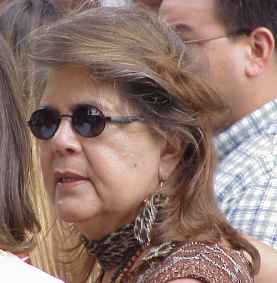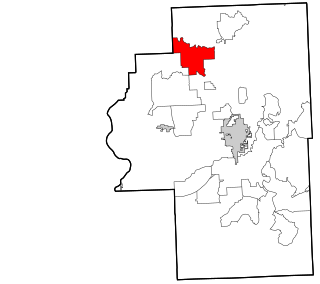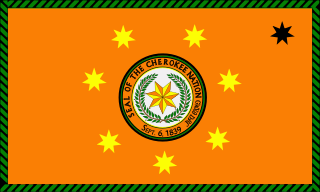Related Research Articles

Cherokee County is a county located in the U.S. state of Oklahoma. As of the 2020 census,the population was 47,078. Its county seat is Tahlequah,which is also the capital of the Cherokee Nation.

Tahlequah is a city in Cherokee County,Oklahoma located at the foothills of the Ozark Mountains. It is part of the Green Country region of Oklahoma and was established as a capital of the 19th-century Cherokee Nation in 1839,as part of the new settlement in Indian Territory after the Cherokee Native Americans were forced west from the American Southeast on the Trail of Tears.

Wilma Pearl Mankiller was a Native American activist,social worker,community developer and the first woman elected to serve as Principal Chief of the Cherokee Nation. Born in Tahlequah,Oklahoma,she lived on her family's allotment in Adair County,Oklahoma,until the age of 11,when her family relocated to San Francisco as part of a federal government program to urbanize Indigenous Americans. After high school,she married a well-to-do Ecuadorian and raised two daughters. Inspired by the social and political movements of the 1960s,Mankiller became involved in the Occupation of Alcatraz and later participated in the land and compensation struggles with the Pit River Tribe. For five years in the early 1970s,she was employed as a social worker,focusing mainly on children's issues.

Northeastern State University (NSU) is a public university with its main campus in Tahlequah,Oklahoma. The university also has two other campuses in Muskogee and Broken Arrow as well as online. Northeastern is the oldest institution of higher learning in the state of Oklahoma as well as one of the oldest institutions of higher learning west of the Mississippi River. Tahlequah is home to the capital of the Cherokee Nation of Oklahoma and about 25 percent of the students at NSU identify themselves as American Indian. The university has many courses focused on Native American linguistics,and offers Cherokee language Education as a major. Cherokee can be studied as a second language,and some classes are taught in Cherokee for first language speakers as well.

The United Keetoowah Band of Cherokee Indians in Oklahoma is a federally recognized tribe of Cherokee Native Americans headquartered in Tahlequah,Oklahoma. According to the UKB website,its members are mostly descendants of "Old Settlers" or "Western Cherokees," those Cherokees who migrated from the Southeast to present-day Arkansas and Oklahoma around 1817. Some reports estimate that Old Settlers began migrating west by 1800,before the forced relocation of Cherokees by the United States in the late 1830s under the Indian Removal Act.

Peggs is an unincorporated community and census-designated place (CDP) in Cherokee County,Oklahoma,United States. It had a population of 813 at the 2010 census,compared to 814 at the 2000 census. A large minority of its residents are Native American,most of them members of 10 tribal groups such as the Cherokee Nation and the Muscogee Creek Nation.

The Cherokee Nation,formerly known as the Cherokee Nation of Oklahoma,is the largest of three federally recognized tribes of Cherokees in the United States. It includes people descended from members of the Old Cherokee Nation who relocated,due to increasing pressure,from the Southeast to Indian Territory and Cherokees who were forced to relocate on the Trail of Tears. The tribe also includes descendants of Cherokee Freedmen and Natchez Nation. As of 2024,over 466,000 people were enrolled in the Cherokee Nation.

Shane David Jett is an American politician from the state of Oklahoma,who is the state senator from Senate District 17,which includes northern Pottawatomie County and eastern Oklahoma County. He was a member of the Oklahoma House of Representatives from 2004 to 2010,representing House District 27. He also serves as chairman of the U.S. Treasury CDFI Fund Community Development Advisory Board.
The Cherokee Female Seminary was built by the Cherokee Nation in 1889 near Tahlequah,Indian Territory. It replaced their original girls' seminary,the first Cherokee Female Seminary,that had burned down on Easter Sunday two years before. The Seminary was listed on the National Register of Historic Places in 1973.

Bill John Baker is a Native American politician who served as Principal Chief of the Cherokee Nation. First elected in October 2011,Baker defeated three-term incumbent Chief Chad "Corntassel" Smith. Prior to his election as Chief,Baker served 12 years on the Cherokee Tribal Council. In 1999,Baker unsuccessfully ran for Deputy Chief of the Cherokee Nation.
Dr. Isabel Keith Baker was a former educator in the U.S. state of Oklahoma. Throughout her 43 years as an educator,Baker taught in several Oklahoma schools,retiring as Professor Emeritus from Northeastern State University in 1994. Baker served on the Oklahoma State University A&M Board of Regents from 1991 until 1999. She played a major role in the renovation of Willard Hall,the home of OSU's College of Education. During her career and throughout her life,Baker has been recognized as a champion of gender equity. In the 1980s,Baker ran for Congress and was defeated by Republican candidate,Tom Coburn.

Chuck Hoskin Jr. is a Cherokee Nation politician and attorney currently serving as the Principal Chief of the Cherokee Nation since 2019. He was re-elected to a second term in the 2023 Cherokee Nation principal chief election.
John Wesley "Wes" Nofire is a Cherokee Nation and American politician and a former heavyweight professional boxer who has served as the Oklahoma Native American Affairs Liaison since 2023. During his boxing career Nofire fought under the name "The Cherokee Warrior". Nofire served on the Cherokee Nation tribal council between 2019 and 2023. He was a Republican candidate in the 2022 primary election for Oklahoma's 2nd congressional district and candidate in the 2023 Cherokee Nation principal chief election.
Candessa Tehee is a Cherokee Nation artist,professor,and politician who has served on the Cherokee Nation tribal council since 2021. She was named a Cherokee National Treasure in 2019.
Sasha Blackfox-Qualls is a Cherokee Nation politician who has served on the Cherokee Nation tribal council since 2023.
Wanda Hatfield is a Cherokee educator and politician who served as an At-Large Tribal Councilor for the Cherokee Nation from 2015 to 2019.
Tina Glory-Jordan is a Cherokee jurist and former politician serving as a justice of the Cherokee Nation Supreme Court since 2023. She was previously the secretary of state from 2019 to 2023. Glory-Jordan was a tribal councilor for district 1 from 2007 to 2015 during which time she was elected speaker of the council.
The Cherokee Nation tribal council is the legislative branch of the Cherokee Nation. One councilor is elected to represent each of the 15 districts of the Cherokee Nation in the 14 county tribal jurisdictional area. Two tribal council members represent the at-large citizenry –those who live outside the tribe's 14-county jurisdictional area in northeastern Oklahoma. The 17 councilors total are elected to staggered four-year terms.
Phyllis Yargee is a Cherokee politician and educator who served on the Cherokee Nation tribal council for district 3 from 2003 to 2007.